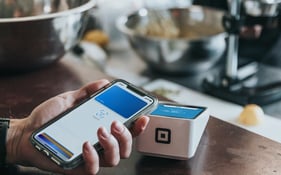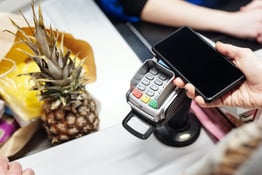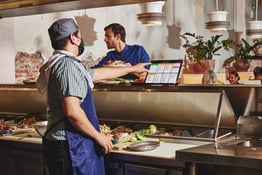If a food truck owner were dreaming up the Mary Poppins of POS systems, you can imagine how they’d design it to be practically perfect in every way. It would have easy set-up, helpful menu modifiers, fast click speed, an excellent back-of-house integration, low subscription fees, online ordering, free trials, no contract, unlimited app integrations, and a gentle voice telling food truck workers that no matter the weather or the traffic, everything is going to be OK.
Suffice it that such a system doesn’t exist (not yet, at least.) What is a POS system, then, that will take your food truck to the next level? We’ve broken down five major POS systems with the highest reputations and the most perks, so you can find the software (and possibly hardware) that suits your food truck’s physical, spiritual, and financial needs. (OK, maybe not your spiritual needs... but definitely those other two!)
The most popular food truck POS: Square
Subscription model: Unlike most POS systems, Square’s base subscription is free, making it a prudent option if you’re just getting started. The Square “Plus” plan is $60 a month, and the company charges $40 for additional perks. But you’re able to test the pricier models for a month free before throwing down cash.
How it works: The free Square app allows you to automatically sync your online store, sell through social media, offer pick up and delivery, and manage basic aspects of your business, like inventory. The “Plus” plan add-ons include 24/7 customer support, marketing assistance, loyalty programs, and team management. Your personal tablet works just fine for the Square app, but if you want to buy cash drawers, card readers, and printers from Square you’ll need to spend another thousand bucks or so.
Why people love it: It’s fast, user friendly, and has a major following. Matt Geller, the founding president of the National Food Truck Association, told us point blank that Square is the most popular option among truck drivers. He says the proximity and collaborative nature of food truck culture serves as a market driver for Square. If you’re having an issue with one of the smaller companies it won’t be long before another truck in the lot will nudge you to switch to the biggest POS.
Why they don’t: The free subscription gets you squat in the way of data ownership, loyalty, team management, or support for actual point of sale (you can’t reopen closed checks, for example). Considering most other POS systems have these perks built into their base subscriptions, Square’s model can seem a little misleading.
A food truck POS with tons of integrations: Toast
Subscription model: Toast has three subscription tiers, priced between $69 and $89, called “Starters,” “Essentials,” and “Growth.” You can demo the service, as you’ll see on the website, but Toast doesn’t offer free trials.
How it works: The system is exclusively cloud-based and requires a one-time installation fee of around $500. Higher subscription tiers will get you loyalty programs, marketing, online ordering, a takeout app, and a hardware starter pack, which includes the tablet, card reader, and router.
Why people love it: With a user-friendly platform and around 70 integrations available (for gift card apps, accounting, data security, etc.), Toast’s platform is the most customizable of any POS. To prove it, the company offers a service called “Toast University” that helps restaurant owners do the most possible with the money they’re spending. It costs more money, though.
Why they don’t: Toast doesn’t offer free trials, and the subscription model is a little opaque. The pricing page suggests that getting started with Toast may cost more coin than some scrappy operations will be able to afford.
A food truck POS with free hardware: Harbortouch
Subscription model: Harbortouch is a curious bird. Its pricing model centers around two hardware choices: the Android tablet Harbortouch Echo, and a more intense desktop setup, the Harbortouch Elite. For a monthly service and support fee of between $29 and $39, the company will set you up with a POS platform and complementary hardware.
How it works: Let’s assume you’re getting the Echo tablet for your food truck. You’ll sign a one-year contract after your trial period with Harbortouch and pay $29 a month to have access to a tablet cash drawer, receipt printer, customer display, employee cards, and keyboard.
Why people love it: There used to be a service fee of around $80, but the company has recently gotten rid of that, making Harbortouch the cheapest option for folks looking to get hardware with their POS. Additionally, as the company boasts in an article it published specifically for food trucks, food truck owners benefit from Harbortouch’s online ordering options, location adaptability, and a hybrid cloud or “always on” model, which allows restaurant owners to use the software in spots with poor connectivity.
Why they don’t: The contract, in a word. Other POS systems make it easier to tap out and switch if you don’t like the service. Also, Harbortouch is owned by the payment processing company Shift4 Payments, so you need to use Shift4’s merchant services instead of your own processing system.
A powerful food truck POS for cheap: TouchBistro
Subscription model: TouchBistro setup starts at $69 a month. To get online ordering you’ll need to spend another $50, but that’s pretty much the only major perk not included in the base membership. You can book a demo and try the service out for a few weeks before committing.
How it works: TouchBistro offers a solid baseline subscription. The $69 a month gets you 24/7 customer service, menu management, cloud reporting, and unlimited integrations. You can either buy its hardware or use your own tablet, and the company offers self-ordering options for quicker turnaround.
Why people love it: TouchBistro works with Square, so payment processing is a lot smoother than other POS systems. It’s also a hybrid cloud system, meaning you don’t need Wi-Fi to operate the software.
Why they don’t: TouchBistro consistently gets low customer support ratings. That’s about it, though.
A food truck POS for data tracking: Revel
Subscription model: Revel’s fees start at $99 a month, plus a one-time fee of about $650. You’ll get training, menu help, and hardware set up. You can lease the hardware or set up a custom payment plan if you need to.
How it works: The subscription and startup fees pay for menu consultation, console training, payment setup, hardware installation, 24/7 phone and text support, social media integration, and the “always on” hybrid cloud model. You get a lot, but it requires a long-term contract.
Why people love it: Revel is the best system for tracking your data. Their menu management service provides analytics on the most popular items and times of day, as well as daily, weekly, monthly, and yearly progress.
Why they don’t: No free trials, and the initial set up is expensive. You also need to pay for access to Revel’s API, which is uncommon with popular POS systems.





